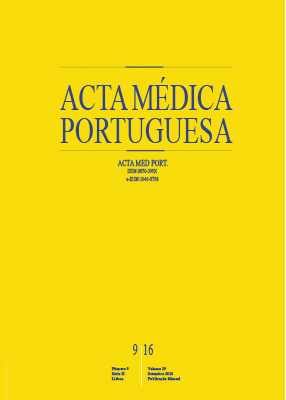Sexual Dysfunction in Breast Cancer Survivors: Cross-Cultural Adaptation of the Sexual Activity Questionnaire for Use in Portugal
DOI:
https://doi.org/10.20344/amp.7389Keywords:
Breast Neoplasms/psychology, Portugal, Sexual Behavior/psychology, Sexuality/psychology, Surveys and Questionnaires, Validation Studies.Abstract
Introduction: The increasing survivor population of breast cancer has shifted research and practice interests into the impacts of the disease and treatment in quality of life aspects. The lack of tools available in Portuguese to objectively evaluate sexual function led to the development of this study, which aimed to cross-culturally adapt and validate the Sexual Activity Questionnaire for use in Portugal.
Material and Methods: The questionnaire was translated and back-translated, refined following face-to-face interviews with seven breast cancer survivors, and then self-administered by a larger sample at baseline and a fortnight later to test validity and reliability.
Results: Following cognitive debriefing (n = 7), minor changes were made and the Sexual Activity Questionnaire was then tested with 134 breast cancer survivors. A 3-factor structure explained 75.5% of the variance, comprising the Pleasure, Habit and Discomfort scales, all yielding good internal consistency (Cronbach’s α > 0.70). Concurrent validity with the FACt-An and the BCPT checklist was good (Spearman’s r > 0.65; p-value < 0.001) and reliability acceptable (Cohen’s k > 0.444). The Sexual Activity Questionnaire allowed the identification of 23.9% of sexually inactive women, for whom the main reasons were lack of interest or motivation and not having a partner.
Discussion: Patient-reported outcomes led to a more comprehensive and improved approach to cancer, tackling areas previously abandoned. Future research should focus on the validation of this scale in samples with different characteristics and even in the overall population to enable generalizability of the findings.
Conclusion: The adapted Sexual Activity Questionnaire is a valid tool for assessing sexual function in breast cancer survivors in Portugal.
Downloads
Downloads
Published
How to Cite
Issue
Section
License
All the articles published in the AMP are open access and comply with the requirements of funding agencies or academic institutions. The AMP is governed by the terms of the Creative Commons ‘Attribution – Non-Commercial Use - (CC-BY-NC)’ license, regarding the use by third parties.
It is the author’s responsibility to obtain approval for the reproduction of figures, tables, etc. from other publications.
Upon acceptance of an article for publication, the authors will be asked to complete the ICMJE “Copyright Liability and Copyright Sharing Statement “(http://www.actamedicaportuguesa.com/info/AMP-NormasPublicacao.pdf) and the “Declaration of Potential Conflicts of Interest” (http:// www.icmje.org/conflicts-of-interest). An e-mail will be sent to the corresponding author to acknowledge receipt of the manuscript.
After publication, the authors are authorised to make their articles available in repositories of their institutions of origin, as long as they always mention where they were published and according to the Creative Commons license.









